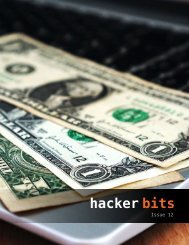Hacker Bits, August 2016
HACKER BITS is the monthly magazine that gives you the hottest technology stories crowdsourced by the readers of Hacker News. We select from the top voted stories and publish them in an easy-to-read magazine format. Get HACKER BITS delivered to your inbox every month! For more, visit https://hackerbits.com/2016-08.
HACKER BITS is the monthly magazine that gives you the hottest technology stories crowdsourced by the readers of Hacker News. We select from the top voted stories and publish them in an easy-to-read magazine format.
Get HACKER BITS delivered to your inbox every month! For more, visit https://hackerbits.com/2016-08.
You also want an ePaper? Increase the reach of your titles
YUMPU automatically turns print PDFs into web optimized ePapers that Google loves.
A mental model is just a concept you<br />
can use to help try to explain things.<br />
Around 2003, I came<br />
across Charlie Munger’s<br />
1995 speech, The Psychology<br />
of Human Misjudgment,<br />
which introduced me to how<br />
behavioral economics can be<br />
applied in business and investing.<br />
More profoundly, though, it<br />
opened my mind to the power of<br />
seeking out and applying mental<br />
models across a wide array of<br />
disciplines.<br />
A mental model is just a<br />
concept you can use to help<br />
try to explain things (e.g. Hanlon’s<br />
Razor — “never attribute to<br />
malice that which is adequately<br />
explained by carelessness.”).<br />
There are tens of thousands<br />
of mental models, and every<br />
discipline has their own set that<br />
you can learn through coursework,<br />
mentorship, or first-hand<br />
experience.<br />
There is a much smaller set<br />
of concepts, however, that come<br />
up repeatedly in day-to-day decision<br />
making, problem solving,<br />
and truth seeking. As Munger<br />
says, “80 or 90 important models<br />
will carry about 90% of the<br />
freight in making you a worldlywise<br />
person.”<br />
This post is my attempt to<br />
enumerate the mental models<br />
that are repeatedly useful to me.<br />
This set is clearly biased from<br />
my own experience and surely<br />
incomplete. I hope to continue<br />
to revise it as I remember and<br />
learn more.<br />
How to use this list<br />
I find mental models are useful<br />
to try to make sense of things<br />
and to help generate ideas. To<br />
actually be useful, however, you<br />
have to apply them in the right<br />
context at the right time. And<br />
for that to happen naturally,<br />
you have to know them well and<br />
practice using them.<br />
Therefore, here are two suggestions<br />
for using this list:<br />
1. For mental models you<br />
don’t know or don’t know<br />
well, you can use this list<br />
as a jumping-off point to<br />
study them. I’ve provided<br />
links (mainly to Wikipedia)<br />
to start that process.<br />
2. When you have a particular<br />
problem in front of you,<br />
you can go down this list,<br />
and see if any of the models<br />
could possibly apply.<br />
Notes<br />
• Most of the mental models<br />
on this list are here because<br />
they are useful outside of<br />
their specific discipline.<br />
For example, use of the<br />
mental model “peak oil”<br />
isn’t restricted to an energy<br />
context. Most references to<br />
“peak x” are an invocation of<br />
this model. Similarly, inflation<br />
as a concept applies<br />
outside of economics, e.g.<br />
grade inflation and expectations<br />
inflation.<br />
• I roughly grouped the mental<br />
models by discipline, but as<br />
noted, this grouping is not<br />
to be taken as an assertion<br />
that they only apply within<br />
that discipline. The best<br />
ideas often arise when going<br />
cross-discipline.<br />
• I realize my definition of<br />
mental model differs from<br />
some others, with mine<br />
being more broadly defined<br />
as any concept that helps<br />
explain, analyze, or navigate<br />
the world. I prefer this<br />
broader definition because<br />
it allows me to assemble a<br />
more wide-ranging list of<br />
useful concepts that may not<br />
be mental models under other<br />
definitions, but I nevertheless<br />
find on relatively equal<br />
footing in terms of usefulness<br />
in the real world.<br />
hacker bits<br />
25















